
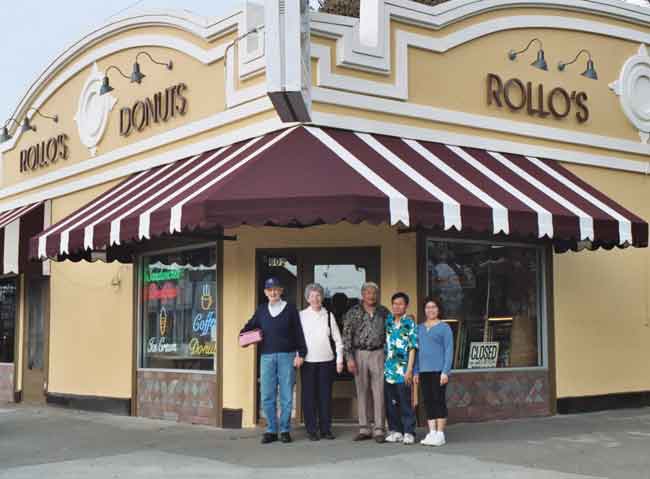
John and Virginia Smothers, Ramon Gonzalez, Paul and Karen Keonakhone, under Rollo's new awnings Eating Around the Neighborhood: Rollo's Donuts: A "Lump of Sweet, Urban Survival in the Heart of Northside"Article and photos by Roseanne Sullivan, published in the Winter 2005/2006 Edition of the Northside Newsletter Every weekday morning at about eight o'clock, Rollo's Donut's shop-owner Karen Keonakhone glances out the plate glass windows from her spot behind the counter. Karen looks over towards Holy Cross Church, diagonally across the intersection of North 13th and East Jackson in the Northside neighborhood of San Jose, and she counts how many people are walking in her direction as the 7:30 weekday Mass lets out, to decide how many cups to set out for them. By 8 a.m., when the influx from the church begins, Karen has already been at work for six hours. She comes in at 2 a.m. seven days a week to help with the doughnut making, which an employee starts at midnight. At 4:00 a.m. when the shop opens, Karen starts serving customers. She doesn't leave until they close the doors at 5 p.m. on weekdays and 2 p.m. on weekends. After interviewing Karen Keonakhone, who owns and runs the shop with her husband Paul and the help of their two children, Christina and Timmy, and learning about their lives for this article, I was struck with how familiar their story is in its underlying theme. Even though Karen and Paul came from Laos, in Southeast Asia, most of us, if not immigrants ourselves, had forebears much like the Keonakhones one or two or three generations back. The Keonakhones went through almost-unimaginable hardships to get to this country, work hard for incredibly long hours for little money, live frugally but act generously. They gradually accumulated enough money to invest in businesses, to buy homes and to send their children to college so they could have a better life. For the Keonakhone family as for most of our neighborhood's other small-business owners, the American dream is still being lived out right here in Northside San Jose--in a little donut shop situated in the geographic and figurative heart of the neighborhood. Rollo's which has been in operation for more than three decades, is a true Northside institution, with a large regular clientele, and deservedly so. Rollo's tied for top doughnut shop in San Jose (with the more-celebrated Lou's), and third overall, well ahead of Krispy Kreme, in a survey of Silicon Valley doughnut shops conducted by the San Jose Mercury News in September 2000. Rollo's fare was voted, "most like the doughnuts you remember from childhoo.d" The group of worshippers and church volunteers heading towards Rollo's around 8 every weekday morning are mostly second-generation Italian grandmothers, great-grandmothers, and great-great-grandmothers, and some of them are peers and relatives of Salvatore (nicknamed Sam) and Rose Ciraulo who bought the property where Rollo's now stands as an investment many years ago. Sam and Rose once once lived a few doors up from the corner on 13th St. near Taylor Street. Sam drove a truck selling fresh vegetables around the neighborhood. Their son, another Salvatore, who was nicknamed Rollo, inherited the property and opened the Rollo's Donuts shop in 1973. A lot of Ciraulos have lived in this neighborhood and many of them were named Sal. Salvatore (Rollo) Ciraulo, son of Sam and Rose, the original building owner, was a cousin of another Sal Ciraulo recently featured in this newsletter: Salvador (Red) Ciraulo, a fire captain who was written about by his granddaughter Samantha. John Smothers, who with his wife Virginia is one of the regulars and who does Rollo's bookkeeping, told me of seeing a 1947 census that listed three Ciraulo families living in the neighborhood. Pauline Ciraulo (widow of Red Ciraulo) recalled four Ciraulo families, relatives of her husband, and told me where they lived. Cousins often have the same first names. In the extended Ciraulo family in San Jose, nicknames, such as Sam, Rollo, and Red, were obviously needed so people could tell one Sal from another. Writing this, I remembered Pauline Ciraulo's joking remark one time last summer that in the old days, if someone called out, "Hey, Sal," a whole bunch of guys would turn around. Six days a week, when the early churchgoers come into the donut shop, they skip the line that goes from the cash register past the doughnut display case and sometimes out the door. They stop to pick up their coffee or tea from employee Ramon Gonzalez or Karen's husband Paul at the counter, and they each hand Karen a dollar before they go to find their seats. 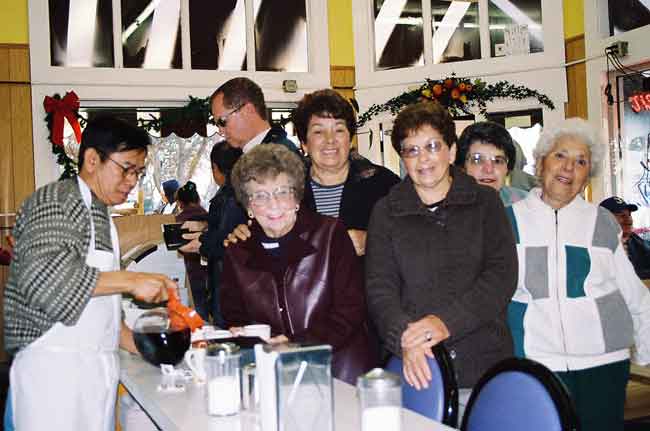
Paul pours coffee for Mae Ferraro, Mabel Maninna, Pauline Ciraulo, Dolores Spada, and Rose Santanocito They squeeze six per tiny booth into one or two booths near each other, and if they run out of room, some of them shoehorn themselves in unselfconsciously with other regulars from other groups in adjacent booths. It's okay to sit with people you don't know at Rollo's. At this place, mostly everyone is friendly with everyone else, even though they often don't speak more than a few words of a common language. The other regulars at that time of day are people fueling up on their way to work. Although the current owners are Laotians, you don't usually see any other Asians there, unless you raise your eyes from your doughnut and gaze out the window facing East Jackson Street. If you look straight ahead, you'll probably see mostly Chinese and Vietnamese working up a sweat at the tennis courts in Backesto park. Just don't let the sight of all that exercise ruin your enjoyment of that fried treat in your hand, which San Jose Mercury News columnist Joe Rodriquez once dubbed "a lump of sweet, urban, survival." Distract yourself by pondering this fact: even though Asians don't usually eat donuts, they make 90% of the doughnuts sold by independent donut franchises in the state of California. Like many of Rollo's other customers, the after-church customers aren't big spenders. They usually have just a cup of coffee or tea, and once a week or so they splurge on a shared plate of doughnut holes. (For anyone who may not know, a doughnut hole is not really a hole, but the dough punched out from the middle of a doughnut and fried separately.) 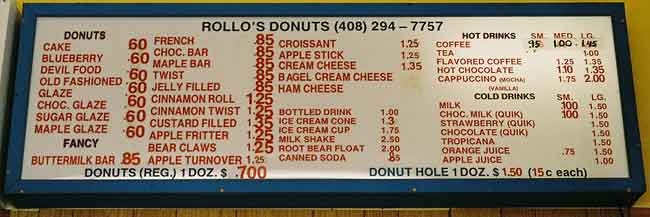
One woman who scrapes by on meager Social Security benefits brings in dry toast to eat from home. Owner Karen doesn't mind. One thing you find out as you get to know her is that she has a big heart. Betty De'Ment, another Rollo's regular, who used to live in a truck parked on the north side of Backesto park, told me that when she used to use Rollo's bathroom to wash herself up every day, Karen offered to pay her a little money every week to keep the bathroom clean, throwing in a bonus of all the doughnuts Betty could eat at the end of the day to sweeten the deal. "I've had so many doughnuts. I'm dough-nutted out," Betty said with a big grin. Prominent on the partial wall separating the eating area from the food preparation area about six feet up the wall is a Buddhist shrine, and when I pointed to the shrine and asked Karen if her religious beliefs are what make her so generous, she seemed to be at a loss for words, until I mentioned Buddha followed with the word, "compassion," and she nodded her head, yes, that the Buddhist religion teaches compassion. The early-Mass-goers leave Rollo's around nine, and the working crowd peters out. As the morning goes on, Karen, Paul, and Ramon continue to help people who come in to buy boxfuls of doughnuts for meetings. On weekends son, Jimmy, 17, and daughter Christina, 18, help out too. In the middle of the day, Rollo's starts to fill with retirees with time on their hands. John and Virginia Smothers come over from their house south of this neighborhood. One tiny Hispanic woman named Minerva Rodriguez, who always wears a large kerchief, and who a lot of people calls Grandma, is a regular too. From time to time, as I've driven up 13th to get on 101, I've caught a glimpse of Minerva near Hedding Street, working her way south with her walker on her way towards Rollo's. 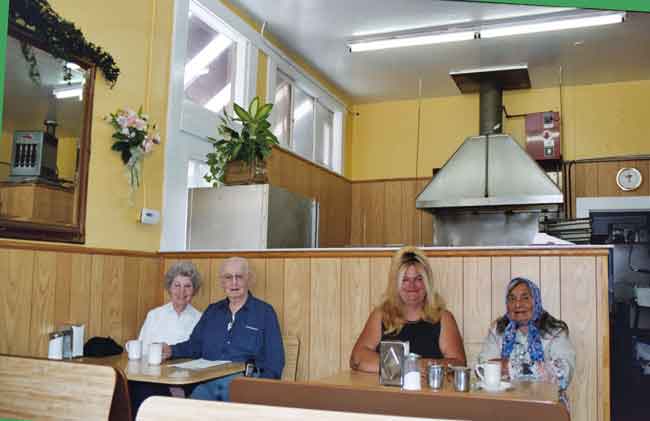
John and Virginia Thomas, Betty De'Ment, and Minerva Rodriguez, on a Sunday afternoon last summer, soon after Rollo's interior got a new coat of paint and some new decorations Another group of regulars comes in around noon for a mid-day doughnut and caffeine fix. Yvonne Ciraulo is one of the mid-day regulars who comes in with a group of friends. Yvonne has many both good and bad associations with the place, because she had been married to Rollo and ran the business with him at the time that Rollo died suddenly in 1983. The generosity the Keonakhone family gives out comes back to them in many ways: For just one example, Yvonne and her friend Nick Maggi long ago got in the habit of picking up bulk items for the shop at Costco and keep delivering the goods them as a favor to help the current owners out. After his death, Rollo's first wife kept the title to the building, and Yvonne got to keep the business. Judy Ciraulo, Rollo's daughter by his first marriage, inherited the building and later married Gary Sunseri, who is active in the 13th Street business association. Together the Sunseris manage the doughnut shop, the adjacent barber shop, and a living unit connected to the east of the building on Jackson Street. Both Gary Sunseri and Lou Chiramonte, who owns Chiramonte's Deli on the other side of 13th Street, mentioned to me that the Rollo's building housed a grocery for many years. Gary remembers that a door went through the wall into the living quarters of the family that ran the grocery where the drinks cooler stands now. Lou recalls the name of the grocery: "Pete and Hazel's Red and White Market." Red and White was an independent grocery supplier with a private label of canned goods. Lou told me that it seemed as though Pete would sell the grocery store to someone new every few years, and when the buyer predictably couldn't make a go of it, Pete would get the business back again, and sell it again. Gary, for his part, remembers his grandfather sending his brother to the market to buy beer for him. 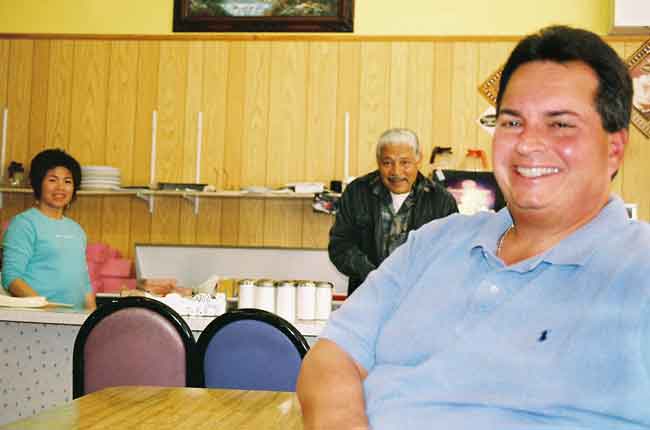
Gary Sinseri, foreground; Karen, left, and Ramon right rear Yvonne ran Rollo's for about two years after Rollo's death, until she sold it to a Laotian friend of the current owners in November of 1985. Karen and Paul's friend who bought Rollo's was running a doughnut shop already in Santa Ana, where Karen and Paul lived at the time, so right after he made the purchase, the friend offered the newlywed couple the job of running of his new donut shop. The only hitch in the offer was that he insisted they had to pack up and move immediately. Because they had only been married a short time and had only a few things, they were able to pile everything they owned into a small truck and get on the road right away, and they actually did start work here at Rollo's one day later. They saved their money for ten years and bought Rollo's from their friend in 1995. When daughter Christina was born in 1987. Karen told me she took only one day off from work. She got the same amount of time off when son Timmy was born two years later in 1979. Christina is now 18 and started at City College in September. "I don't want her to go too far yet," Karen said. Christina plans to be a dentist, but the family wanted her to attend her first two years of college close by. "You don't spend the big money first. After two years," said Karen, "We'll have to decide" [where Christina goes to finish her studies]. Karen's children aren't the only ones who are getting older. "My customers have kids, now they have babies. Oh my, I'm getting old," Karen lamented. Karen and Paul's journey to Northside San Jose started in Laos, not far from the Cambodian border. Karen and Paul (whose Laotian names are Sansamone and Yoke Depe) grew up on the Mekong River. As young children, they lived two hours by boat away from each other. Later they lived very close to one another in a small city in Laos, and they were surrounded by one another's relatives there and in the United States. But they never met until they were in their late 20s, in of all places, Murfreesboro, TN, Karen began the story by telling me that the area she grew up in is called Si Phan Don, or Four Thousand Islands. Baan Khone, the town where her family lived is fifteen minutes from LiPhi Falls, which she told me proudly are more spectacular than Niagara Falls. "My country is very beautiful," she said, "because of the river and the trees." She named coconut, mango, papaya, and palm. You can hear all the time, she said, the water crashing on the rocks. The expression on her face made me sense something of what it must have been like on her home island Don Khone, with the sound of the falls surrounding everything, the crash of the water permeating the foam-charged air. Web sites that book travel adventures to LiPhi Falls mention the astounding force of the water and the violently plunging waterfalls. In summertime the Mekong River water level always goes down and many islands appear that are submerged the rest of the year. Karen's school was on the next island from her home, and there was a bridge she could have used to get to and from the school. But like all kids, she was a bit lazy, and the bridge was a little bit out of her way, so she would take off her clothes and tie them with her books to a pole and wade across the river, taking advantage of the fact that in the summertime, the water was only up to her waist. The family would plant rice in August and harvest it two months later. They also dried fish that were washed up near the shore by the powerful waves. They brought the dried fish, sticky rice, and betel nuts to market on the mainland to Pakse. Pakse is a small gateway city at the confluence of the Mekong and the Se Don rivers where the people from the islands disembark when they sail their boats to the mainland to find markets. Paul's family lived in Pakse. And later when Karen and her family moved to Pakse, "We knew all his [Paul's] cousins," but they never met him. When Paul and Karen later got married, she told me, he didn't have to introduce her to his cousins. They already knew who she was. Karen's family went back to their home island every year, where Karen's grandmother and aunt still lived, to grow rice. And then they would sell the rice when they returned to Pakse after the growing season was over. But what they made was not enough to live on. Then the Cambodians came into power in 1975, and while the conditions weren't nearly as bad for the Laotians under Cambodian rule as they were other places, after five years of difficult economic times under the Cambodian regime. Karen's family decided to leave. Karen's uncle, her mother's brother, was the first to come the United States. He settled in Santa Ana. Karen's immediate family left Laos in 1980, first going to a refugee camp in Thailand for a month and then for 10 months to another camp in the Philippines. Karen's immediate family was able to leave the camp when they got sponsored by her father's cousin in Murfreesboro Tennessee. Paul's family had in the mean time moved to Stockton and then to Santa Ana, where they lived across the street from Karen's uncle. Since Paul and Karen's uncle they were both single, Paul and Karen's uncle became friends. In 1984, fifteen friends left Santa Ana for Murfreesboro for a vacation, and during that visit, Paul and Karen finally met. They talked long distance on the phone for a year before they were married July 6, 1985. They were married and living in Santa Ana for only a few months before they packed up everything and came here. As noted in other issues of this newsletter, Rollo's Donuts recently had an external face lift. Gary Sunseri, the property owner, used Redevelopment Agency funds to make some changes to the facade, notably very attractive lighting and tilework, and new brown and white striped awnings that pull the whole look together beautifully. Karen and family have brightened up the inside with a coat of pale yellow paint that matches the exterior and some new decorations, although the wood grain formica tables and artificial flowers and plants express another sensibility than the one reflected by the studio-designed exterior. Not that there's anything wrong with multiple design sensibilities mind you. Glancing around the wide variety of housing stock in the neighborhood, you'll see a spectrum of sensibilities that in much the same way as Rollo's Donut Shop epitomizes the spirit of where we live.
602 North 13th Street (at the corner of East Jackson) San Jose, CA 95112 Phone: (408)294-7757 Fax: (408) 995-5166 Mon-Fri 4:00 a.m. to 6:00 p.m. Sat-Sun 4 a.m. to 3:p.m. "Eating around the neighborhood" is a regular review of local eating places. Roseanne Sullivan is a writer and artist who has been a Northside resident for 5 years. Contact her with leads for good places to eat out, at: [email protected]. |
Last Updated: 2/15/2006